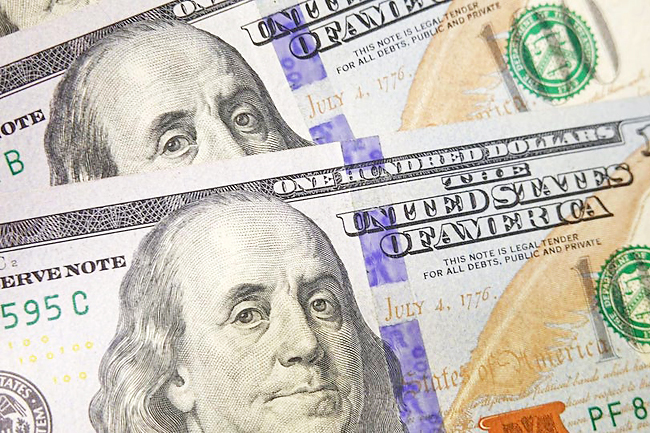NEW YORK (AP) – The buck isn’t stopping.
The value of the United States (US) dollar has been on a tear for more than a year against everything from the British pound across the Atlantic to the South Korean won across the Pacific.
After rising again on Friday, the dollar is near its highest level in more than two decades against a key index measuring six major currencies, including the euro and Japanese yen.
Many professional investors don’t expect it to ease off anytime soon.
The dollar’s rise affects nearly everyone, even those who will never leave the US borders.
Here’s a look at what’s driving the US dollar higher and what it can mean for investors and households:
WHAT DOES IT MEAN TO SAY THE DOLLAR IS STRONGER?
Essentially that one dollar can buy more of another currency than it could before.
Consider the Japanese yen. A year ago, USD1 could get a little less than JPY110. Now, it can buy 143. That’s about 30 per cent more and one of the biggest moves the US dollar has made against another currency.

Foreign currency values are constantly shifting against each other as banks, businesses and traders buy and sell them in time zones around the world.
The US Dollar index, which measures the dollar against the euro, yen and other major currencies, has climbed more than 14 per cent this year. The gain looks even more impressive compared against other investments, most of which have had a dismal year. US stocks are down more than 19 per cent, bitcoin has more than halved and gold has lost more than seven per cent.
WHY IS THE DOLLAR STRENGTHENING?
Because the US economy is doing better than others.
Even though inflation is high, the US job market has remained remarkably solid. And other areas of the economy, such as the services sector, have been resilient.
That’s helped offset worries about a slowing housing industry and other parts of the economy that do best when interest rates are low. That in turn has traders expecting the Federal Reserve to follow through on its promise to keep hiking interest rates sharply, and to hold them there a while, in hopes of knocking down the worst inflation in 40 years.
Such expectations have helped the yield of a 10-year Treasury more than double to 3.44 per cent from roughly 1.33 per cent a year ago.
WHO CARES ABOUT BOND YIELDS?
Investors who want to make more income off their money. And those juicier US yields are drawing investors from all over the world.
Other central banks have been less aggressive than the Fed because their economies seem to be more fragile. The European Central Bank just raised its key rate by the largest amount ever, three-quarters of a percentage point. But the Fed has already raised its key rate by that amount twice this year, with a third expected this upcoming week. Some traders even say a gargantuan hike of a full percentage point could be possible, following a hotter-than-expected report on US inflation today.
Partly because of that less aggressive bent, 10-year bonds across Europe and other areas of the world offer much lower yields than US Treasurys, such as Germany’s 1.75 per cent and Japan’s 0.25 per cent. When investors from Asia and Europe buy Treasurys, they have to trade their own currencies for US dollars. That pushes up the dollar’s value.
A STRONG DOLLAR HELPS US TOURISTS, RIGHT?
Yes. US travellers in Tokyo spending JPY10,000 on dinner will be using 23 per cent fewer dollars than a year ago for the same-priced meal.
With the dollar up sharply so far this year against everything from the Argentine peso to the Egyptian pound to the South Korean won, the dollar is going further in many countries than before.
DOES IT HELP ONLY RICH PEOPLE WHO CAN AFFORD TO TRAVEL ABROAD?
No. A stronger dollar also helps US shoppers by keeping a lid on prices for imports and pushing downward on inflation.
When the dollar is rising against the euro, for example, European companies make more euros on each USD1 of sales. With that cushion, they could cut the dollar price for their products and still make the same amount of euros. They could also leave the price in dollars alone and pocket the extra euros, or they could find some balance of the two.
Prices for imports fell one per cent in August from a month earlier, following July’s 1.5 per cent drop, offering some relief amid the nation’s high inflation. Prices for imported fruits, nuts and some peels dropped 8.7 per cent, for example. They’re down three per cent from a year earlier.
A stronger dollar can keep prices in check for commodities generally. That’s because oil, gold and others are bought and sold in US dollars around the world. When the dollar rises against the yen, a Japanese buyer can get fewer barrels of crude for the same number of yen as before. That can mean less upward pressure on oil prices.
SO THERE ARE ONLY WINNERS FROM A STRONG DOLLAR?
No. US companies that sell abroad are seeing their profits get squeezed.
At McDonald’s, revenue fell three per cent during the summer from a year earlier. But if the dollar’s value had simply stayed put against other currencies, the company’s revenue would have been three per cent higher.
Microsoft, meanwhile, said changes in foreign-currency values sliced USD595 million off its revenue in the latest quarter.







